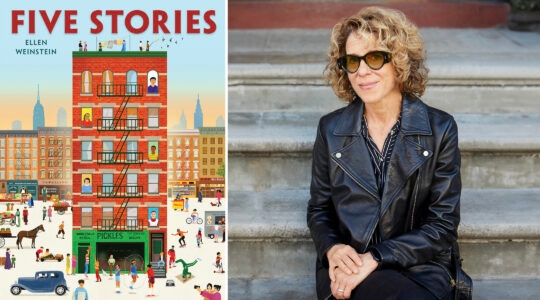BERLIN (JTA) – The image of a horned Ariel Sharon with vampire-like teeth is one of several jarring displays that greet visitors these days to Germany’s Foreign Ministry building in Berlin.
Among others is a depiction of President George Bush surrounded by bearded rabbis as his gurus and a description of Israel as the “Fourth Reich.”
Unlike during the Third Reich, these images on public display are not official German propaganda but part of a German government exhibition on contemporary anti-Semitism that aims to show that anti-Jewish sentiment in the German Republic, and in Europe generally, is not just a relic of the past.
“Anti-Semitism? Antizionism? Israeli Critique?” opened Aug. 1 in the atrium of Germany’s Foreign Ministry. In September it will begin an extensive tour of German cities, starting at Berlin’s Technical University.
The exhibit, a collaborative effort between Israel’s Yad Vashem Holocaust Memorial and the Berlin-based Center for Research on Anti-Semitism, takes on an issue of enduring controversy: Just when does criticism of Israel cross the border of legitimacy?
“There is a clear boundary in debates about solidarity with Israel,” Gernot Erler, minister of state at Germany’s Federal Foreign Office, said, introducing the exhibit to some 200 guests at the opening. “Israel’s right to exist within clear and recognizable borders is a non-negotiable point.”
Anti-Semitism “should be an illness of the past,” Erler said. “Unfortunately, anti-Semitism is not in the closet. It is a part of European current events, it is in the middle of society.”
The visually powerful exhibit, which was designed by Israel’s Muli ben Sasson and is funded in part by the German Center for Political Education, is arranged on a series of panels that form linked rooms.
It presents both the reality of Jewish diversity and the power of stereotypes that propagate hate and, sometimes, violence. The exhibit includes the results of surveys showing strong anti-Semitic sentiment in Europe, such as the Anti-Defamation League’s 2005 poll that found that 50 percent of Europeans think Jews talk too much about the Holocaust.
While the exhibit includes examples from many countries, it takes a close look at anti-Semitism in Germany whether from the far right, far left or Islamic extremists.
“We in Germany are in danger of seeing anti-Semitism as a problem of others, such as Poles, and to consider ourselves free of it,” said Wolfgang Benz, director of the 25-year-old research center, which is part of the Technical University .
Benz cited German sociologist and philosopher Theodor Adorno, who once called anti-Semitism “a rumor about the Jews.” Benz said, “We have to counter that rumor with enlightenment.”
The exhibition covers Christian anti-Jewish attitudes, racist anti-Semitism, post-Holocaust hatred of Jews, which is sometimes expressed as Holocaust denial or resentment against reparations, and anti-Zionism as anti-Semitism – namely, the denial of Israel’s right to exist.
“In a time when two-thirds of the German people promulgate that Israel is the biggest threat on earth, you can’t have enough exhibits like that,” the president of Berlin’s Jewish community, Gideon Joffe, told JTA.
One panel of the exhibit cautions against the “Nazification of Israel,” saying Israel’s actions “are not in any way comparable with the Holocaust, neither in their intention nor in their dimension. Comparisons between the Mideast conflict and the Holocaust make light of the genocide against the Jews and are a defensive reaction against historical responsibility.”
Another exhibit item cites the newspaper of a radical Turkish group in Germany, which says Judaism is a religion “rooted in terror” that divides people into a class of “rulers-Zionists,” and a class of “slaves to the sons of Israel.”
Curators said they used only 10 percent of the raw material they had collected for the exhibit.
“It was hard to choose,” said Yad Vashem’s Doron Avraham, who curated the exhibit along with historian Juliane Wetzel of the Center for Research on Anti-Semitism.
“As an Israeli, I am very used to such expressions. But I was surprised by the volume.”
The exhibit includes some Israeli examples of harsh self-criticism to underscore the point that the litmus test for anti-Semitism is not whether or not Israel is criticized, but how, exactly, Israel and Israelis are portrayed.
“I am always shocked by the Sharon caricatures, by the rawness and the evil in them,” Benedikt Haller, the Foreign Ministry’s liaison to Jewish organizations, said after viewing the exhibit. “Debate is good, but we are firm about the fact there are boundaries.”
Barbara Witting, director of the Jewish high school in Berlin, said she hoped students would see the exhibition.
“It is important to recognize that the problem is still alive,” she said. “In Germany they know what happens if you do not interfere right from the beginning.”
Over the last year, several Jewish students transferred to Witting’s school after enduring anti-Semitic taunts in other schools.





